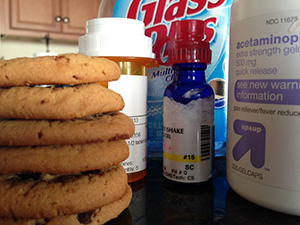By Dr. Karen Burks, Associate Veterinarian
 Our pets are important to us, as is their health, happiness, and safety. In addition to routine vaccines, bloodwork, preventative care (such as spay/neuter, heartworm preventative, and flea preventative), it is important to keep them safe from the hazards they face on a daily basis. Today we are going to discuss some common toxic substances that your pet may be exposed to in their day-to-day lives.
Our pets are important to us, as is their health, happiness, and safety. In addition to routine vaccines, bloodwork, preventative care (such as spay/neuter, heartworm preventative, and flea preventative), it is important to keep them safe from the hazards they face on a daily basis. Today we are going to discuss some common toxic substances that your pet may be exposed to in their day-to-day lives.
1.) Lilies- Easter is coming up, so make sure to safeguard your cats. All true lilies can cause severe, acute kidney failure in cats. This can occur with an extremely small amount of pollen, petal, or leaf. Monitor any and all bouquets that come in to the house and remove any lilies. Do not plant lilies in the yard if your cats go outside. If you suspect your cat had access to a lily, give us a call right away! Symptoms of kidney failure include increased thirst, increased urination, decreased appetite, vomiting, weight loss, lethargy, and occasionally, decreased thirst.
2.) Grapes/raisins- These seemingly innocuous foods can cause kidney failure in dogs. Unfortunately, we do not know the exact substance in grapes that causes the toxicity, and some dogs appear to be more sensitive than others. It is best to avoid them entirely.
3.) Chocolate- Dogs cannot metabolize caffeine and theobromine appropriately. Overdoses can cause vomiting & diarrhea, then hyperexcitability, tremoring, hypertension, and seizures. The darker the chocolate, the more toxic it is likely to be.
4.) Xylitol- Xylitol has become a popular low-calorie sugar substitute. For dogs, it competes with glucose in the blood and can cause severe low blood sugar, seizures, and liver failure.
5.) Most human and animal medications (when consumed in high enough quantities)- Even commonly-used and seemingly-safe medications can be toxic if consumed at a higher than prescribed dose. Common overdoses include NSAIDs (ibuprofen, aspirin, carprofen, meloxicam), anti-depressants, supplements, heart medication, etc.
6.) Canine flea preventatives for cats- Certain canine flea medications contain permethrins or permethrin derivatives, which can cause severe, seizure-like tremors in cats. Please consult a veterinarian before choosing medications for your pets, and NEVER apply canine products to a cat.
7.) Onions/garlic- Both can cause anemia in both cats an dogs. While they are touted as healthy foods for humans, they are toxic to pets.
8.) Rodenticide- Rat poison is flavored to appeal to rats, which means it tastes pretty good to dogs and cats, too. There are several types of rodenticide, but the most common either cause bleeding disorders or seizures.
This list is meant to include the most common toxicities that our pets encounter, however, it is in no way complete. If your pet eats something he/she isn’t supposed to, please call Pet Dominion at 301-258-0333. or call the ASPCA’s Poison Control Hotline at 888-426-4435 (fee may apply).
Time is of the essence in the event of a toxicity. The initial goal is to prevent any of the toxin from being absorbed, as many of these toxins (lilies, grapes/raisins, neurologic rat poison, NSAIDs, xylitol, etc) are not reversible if they’ve already begun to cause damage. If you wait for clinical signs to start, it may be too late. One of our vets will determine a decontamination protocol that may include: inducing vomiting, giving activated charcoal to bind and prevent absorption, hospitalization with IV fluids, etc.
If your pet eats something toxic, BRING THE PACKAGE, as this could contain important information about active ingredients, concentration of toxin, or medical recommendations.
As with any medical malady, an ounce of prevention is worth a pound of cure.
- Do not allow your pets access to any toxic substance.
- Make sure to crate-train your dog as a puppy, so they are not allowed to roam and have access to the rest of the house.
- Keep cats indoors.
- Keep household chemicals locked up.
- Look up any plant that you keep indoors to make sure it is pet-safe.
Please do not hesitate to call us at 301-258-0333 if you have any questions about the above-mentioned, or any other, toxins.
Have a safe and happy spring!